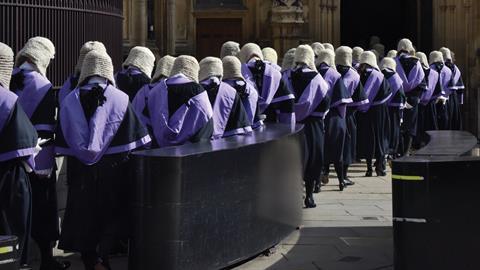The senior judiciary remains one of the most elitist professions in the UK – but there are signs that class barriers are slowly coming down.
Research by the Sutton Trust found that that 62% of senior judges attended a private school – one of the highest proportions of any profession. The figure has remained roughly the same since 2019, although it has decreased from 71% in 2014.
Only 21% of senior judges attended comprehensive schools, although this proportion has increased significantly since 2019 and compares even more favourably to 2014, when 4% were comprehensive-educated.
Three-quarters of senior judges earned a bachelor’s degree from either Oxford or Cambridge, comfortably making it the profession with the highest Oxbridge attendance featured in the report.
The Sutton Trust, a charity which champions social mobility, said the legal profession has been notoriously difficult for people from lower socio-economic backgrounds to enter.
While it is vital that the top echelons of the judiciary represent the best of the sector, it expressed concern that so many are drawn from such a narrow segment of society.
Read more
Katy Hampshire, director of programmes at the Sutton Trust, said: ‘It’s disappointing to see that the senior judiciary remains one of the most elitist professions in Britain, despite efforts to widen access to the legal sector in recent years. Senior judges wield significant power, so it’s crucial that they are more representative of the people that they serve.
‘Increasing diversity in the sector overall is important, but improving access for those entering the profession is only the beginning. Gaps in progression must also be addressed to ensure that socially mobile individuals are able to reach the most influential positions in the legal profession.’
Initiatives such as PRIME, an alliance of more than 60 law firms and in-house legal teams across the UK and Ireland, have been created to improve access to, and socio-economic diversity within, the legal profession.
Lady Chief Justice Baroness Carr has spoken publicly about the need to make diversity in the judiciary a priority, saying her ambition was to have a judiciary where ‘no-one should feel that they are perceived as "'ess" because of their differences, personal or professional background, judicial office or jurisdiction’.
A programme pioneered by the Sutton Trust offers young people aged 16-18 from disadvantaged backgrounds the opportunity to take part in a two-year programme to explore what studying and working in the legal profession is really like.
Senior judges included in the report were the lady chief justice, Supreme Court judges, lord and lady justices of appeal and High Court judges as of January 2025. School data was found for 94% and university data for 99%. The report, entitled Elitist Britain 2025, looked at a range of professions which have historically been closed off to less advantaged groups in society.
This article is now closed for comment.




























35 Readers' comments